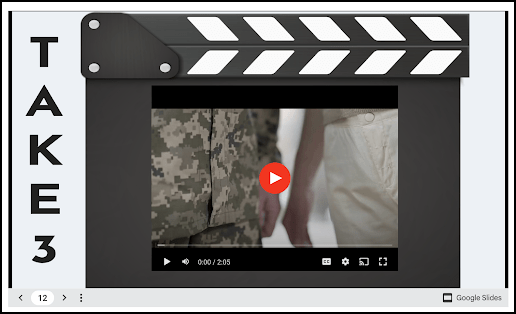Instructional Designer: Kelly Cross
Client: The University of Delaware’s Veterans Health Administration Patient Experience Academy
Contents
- Introduction
- Veteran Patient Experience Academy Resumes Online
- A Historical Perspective: The Veterans Health Administration’s Community of Practice
- Veterans Health Administration Patient Experience Academy (VA PX Academy)
- VA PX Academy’s Online Delivery Format
- VA Pax Academy’s Learning Modules
- VA PX Academy Course Design
- A Design Experience to Remember
- References
Introduction
The University of Delaware’s Patient Experience Academy (PX Academy) was established in collaboration with the ChristianaCare Health System (CHSS) in 2014. Based on the significant results and the successes of the program, the Wilmington VA Medical Center approached UD about bringing the Patient Experience Academy to its healthcare system with the curriculum tailored to meet the VA’s unique priorities. The program was unveiled in 2018 at the UD’s STAR Campus. Despite the significant outcomes of the intervention, the face-to-face program was paused due to the COVID-19 pandemic in 2020.
Veteran Patient Experience Academy Resumes Online
Delivering exceptional customer service and promoting a positive patient experience is the number one strategic objective for the VA’s 2022-2028 strategic plan. To achieve this goal, the VA PX Academy resumed in 2022, via a well-designed online delivery. Here is where the University of Delaware’s Academic Technology Services (ATS) comes into play with creative and engaging designs that are effective and offer the opportunity to deliver Patient Experience Academy online anywhere in the United States.
A Historical Perspective: The Veterans Health Administration’s Community of Practice
The US Department of Veteran Affairs 2014 research revealed that “over 20 million veterans resided in the USA” (Olenick, Flowers, and Diaz, 2015, p. 638). “The Veterans Health Administration (The VA) is America’s largest integrated health care system, providing care at 1,298 health care facilities, including 171 medical centers and 1,113 outpatient sites of care of varying complexity, serving 9 million enrolled veterans each year” (US Department of Veterans Affairs, 2022). The current administration has charged Dennis McDonough, VA Secretary and head of the Veterans Experience Office (VEO), with working together with “federal departments and agencies, with Veterans service organizations, with the National Association of State Directors of Veterans Affairs (NASDVA), and with other state and local organizations, both public and private” to serve all Veterans. According to the US Department of Veteran Affairs website’s VEO Partnerships (https://www.va.gov/ve/partnerships/index.asp), the VEO’s purpose is to “create a community of practice with community partners allowing Veterans and their families across all eras and demographics to access community resources and care, improve the Veteran’s experience, and create a coordinated support system to make services easier, more effective, and delivered with positive emotion.”
Authors Olenick, Flowers, and Diaz (2015) assert that “veterans are seeking health care services in the VA as well as civilian treatment facilities [and] in order to understand and address health care needs of this vast and growing population, incorporating veteran-specific content into curricula is of primary importance.” The VA has made it a national priority “to make and provide patient-centric services to veterans and their families” (Poorani and Kane, 2021, p. 1). In alignment with the VOE’s community of practice, the Wilmington VA Medical Center (W VAMC) and the University of Delaware’s Department of Hospitality and Sport Business Management at the Lerner College of Business & Economics established a partnership called the “VA Patient Experience Academy.” (p. 1).
Veterans Health Administration Patient Experience Academy (VA PX Academy)
The guiding principles of the VA PX Academy is to create a consistent culture of human connections in all interactions in various touchpoints in the Veterans’ journey. Phase 1, a previous program iteration, launched with 25 managers and 5 cohorts including “physicians, nurse practitioners, registered nurses, licensed practical nurses, medical staff assistants, and staff,” (Poorani and Kane, 2021, p. 1) which yielded very positive results. This afforded the opportunity to continue the community of practice with other Veterans’ organizations to expand access to learner-centric instruction across twenty cohorts. This next phase of the academy included University of Delaware (UD) faculty members from the Department of Hospitality and Sports Business Management at the Lerner College of Business and Economics, Dr. Ali Poorani, Dr. Sheryl Kline, William Sullivan; Allan Carlsen, director Healthcare Theatre; in collaboration with Academic Technology Services’ (ATS) departmental liaison, Paul Hyde, instructional designer, Kelly Cross; members of Professional and Continuing Studies (PCS), Rachel Miller, Meghan Phelan, and Vic Wang; and Dr. Tanveer J. Qureshi, Associate Chief of Staff over Primary Care Services and Program Representative from the VA.
VA PX Academy’s Online Delivery Format
The online program uses both synchronous and asynchronous formats using Zoom and Canvas platforms respectively. UD’s Professional and Continuing Studies (PCS) leads and facilitates all aspects of attendee registrations, Canvas secure access, and program management that leads to a certification of attendance and 1.1 continuing Education Units (CEUs).
VA Pax Academy’s Learning Modules
Six learning modules were developed for the following audiences: Physicians, RNs, LPNs, and MSAs in Primary Care, Specialty Care, Behavioral Health and Social Work.
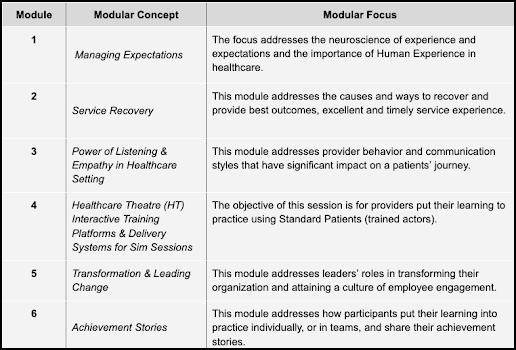
Faculty with the Department of Hospitality and Sports Business Management at the Lerner College of Business & Economics and the Healthcare Theater from the College of Health Sciences facilitate the VA PX Academy’s learning modules and provide instructional designer, Kelly Cross, with the course content to develop effective and innovative course design.
The primary purpose of the VA Patient Experience academy is to put veterans first by working with participants, practicing their skills, and discussing the application of these skills in their day-to-day work and throughout the Wilmington VAMC and five satellite locations in Delaware and South New Jersey.
VA PX Academy Course Design
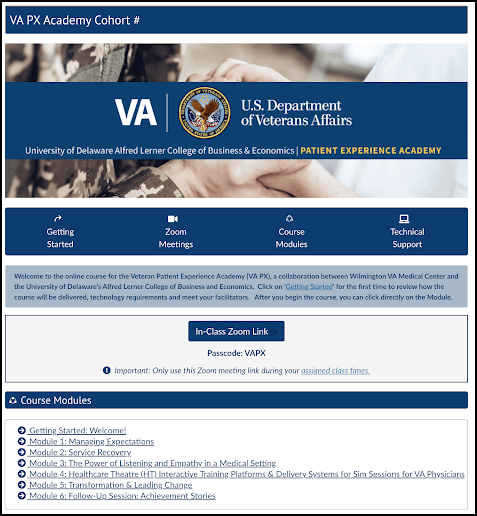
With the program resuming online, ATS Instructional Designer, Kelly Cross, jumped right in meeting with the subject matter experts to quickly design this cohort experience, which was launched in the Fall 2022 semester. New to her ATS role and working with course design in the higher education sector, Kelly said she was “excited to have the opportunity to create content design for a course that provided opportunities for the health care system to better the quality of care for Veterans’ and their families.” Kelly personified her excitement by developing interactuce and user-friendly course design for visual engagement and aesthetics as well as for the ease of navigation. She developed the content’s organizational structure based on instructional materials she gathered from each course facilitator. Kelly designed the VA PX Academy course to provide a user experience that involved sequenced learning coupled with embedded modular progression indicators.
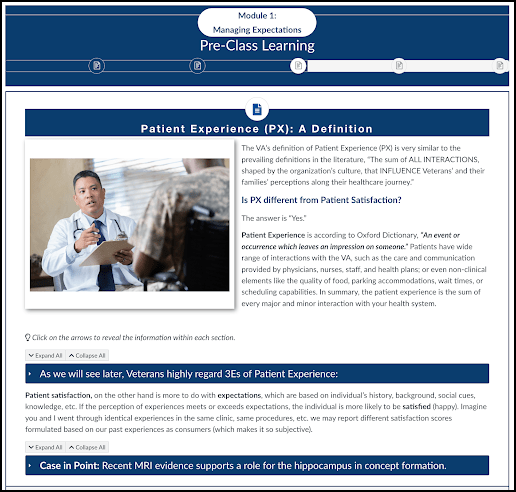 The learning sequence began with pre-readings, then the completion of interactive assignments, and concluded with integrative live zoom sessions led by the course facilitators. The modules’ organizational structure introduced a module every two weeks for the duration of the course. Kelly incorporated an overview and checklist page that set the tone for what participants could expect to complete for the week along with any important reminders and their weekly learning goals.
The learning sequence began with pre-readings, then the completion of interactive assignments, and concluded with integrative live zoom sessions led by the course facilitators. The modules’ organizational structure introduced a module every two weeks for the duration of the course. Kelly incorporated an overview and checklist page that set the tone for what participants could expect to complete for the week along with any important reminders and their weekly learning goals.
She designed each module, with learning components for guided practice, breakout/group work and important information that prepared participants to create an achievement story as their summative assessment.
Each module consists of:
- An Overview and Checklist
- Pre-Class Learning
- In-Class Learning
She developed course materials that included themed Google Slide presentations for in-class learning as well as customized Powtoon Video presentations with course facilitator welcomes and overviews of the modular expectations and learning materials.
To help learners integrate their learning across the modular content, Kelly embedded interactive activities that were polling questions in the pre and in-class learning pages in each module, too. Participants completed a variety of question types using Poll Everywhere to check prior knowledge, rank concepts, respond to multiple choice questions, and self-reflect by responding to open-ended questions.
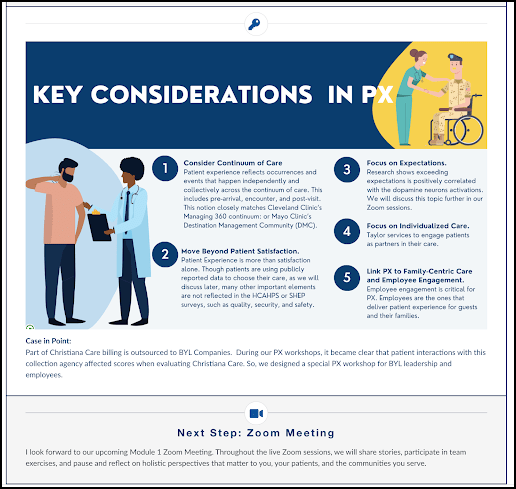
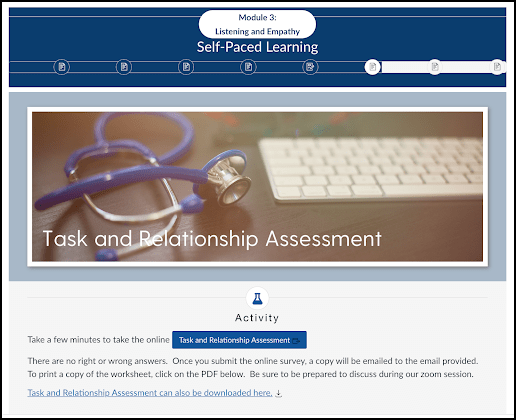
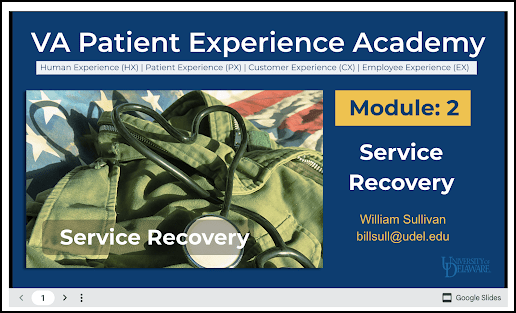
A Design Experience to Remember
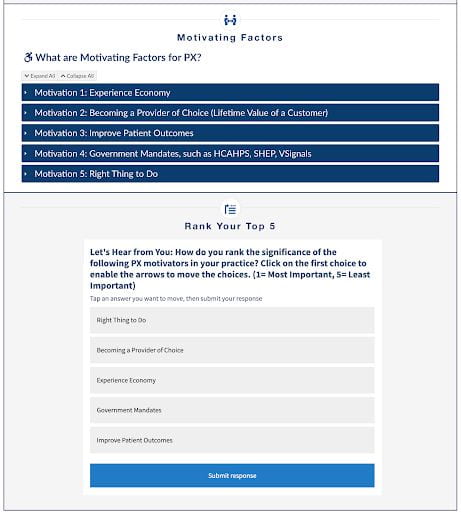
Kelly came to ATS from the K-12 community and was thrilled to have had the opportunity to transfer her course design expertise to this robust project. As Kelly reflects on all her innovative design work for this course as well her support to the faculty in the delivery of this cohort experience, she shared that “this was my first project at UD after being hired in January 2022.” She welcomes the opportunity to continue this work and also shared that she “enjoyed working with faculty and creating a course designed for participants to engage and explore the content necessary for them to learn and apply to their profession.”
Academic Technology Services (ATS) offers instructional design services to instructors, pairing them with course design experts and educational technology consultants for support in their teaching and learning practice. This service strives to help subject matter experts transform their teaching by following systematic, research-backed processes. Designers bring their teaching experience, instructional design skills, and collaborative ties with other UD instructional support partners to create high quality educational experiences.
Need the help of an instructional designer to support your course design?
For more information, contact Academic Technology Services at ats-info@udel.edu, peruse our ATS Instructional Design webpage, or contact your dedicated instructional designer by accessing this College directory.
References
Poorani, A and Kane, V. (2021). Veteran Patient Experience Academy: Putting Veterans First. Journal of Patient Experience, 8, 1-6.
Olenick, M.,Flowers, M., and Diaz, V. (2015). US Veterans and Their Unique Issues: Enhancing Health Care Care Professional Awareness. Advances in Medical Education and Practice, 6, 635-639. Retrieved from dovepress.com

